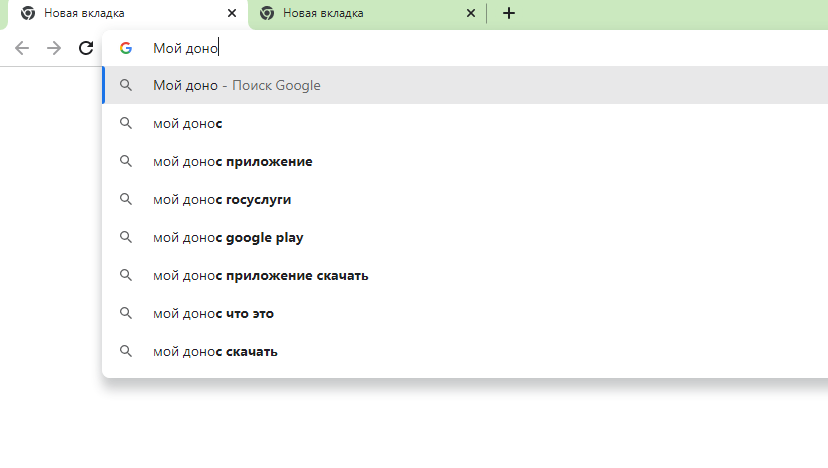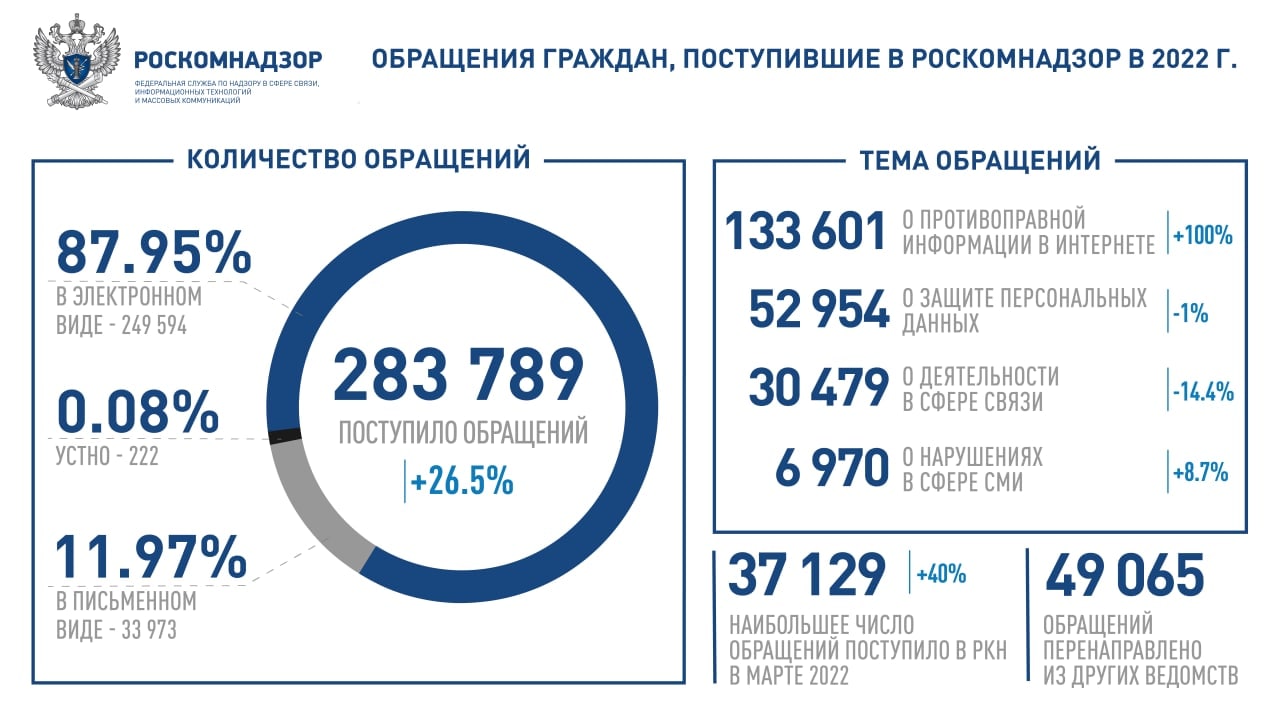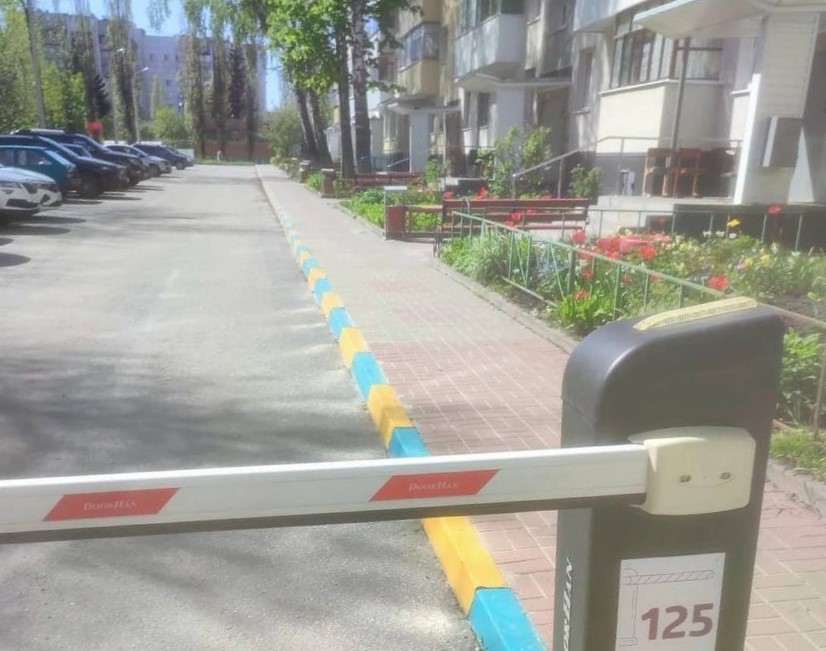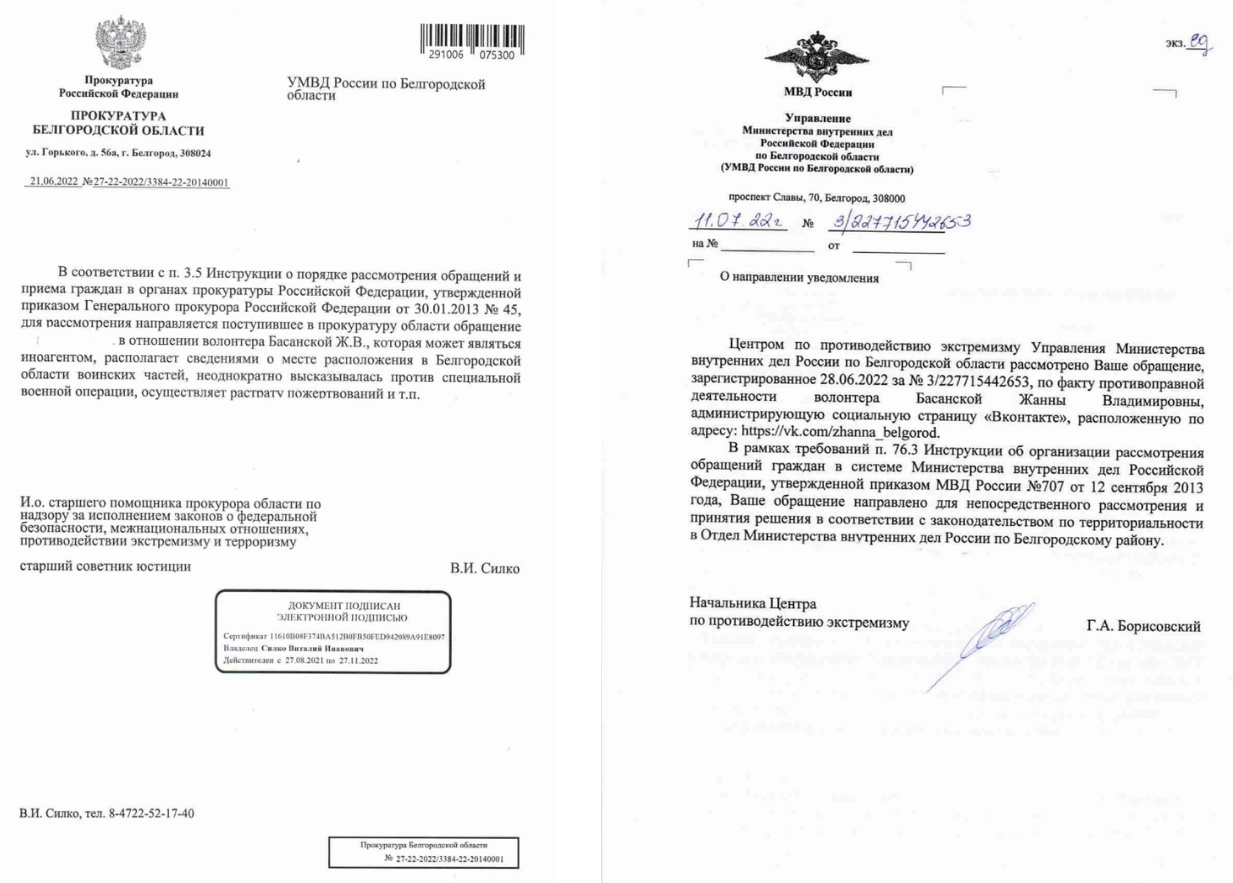"My denunciation" – in the subway, coffee shops and reserved seat cars
For Irina, a Muscovite, going to her favorite coffee shop ended in a conflict, a denunciation, and a fine of 30,000 rubles for “discrediting” the Russian army. The girl made a remark to an aggressive visitor who loudly called for reprisals against Ukrainians – in response, he called the police and wrote a denunciation. At first, the policemen dispensed with the recommendation: “You don’t need to discuss this in public places,” and were already ready to let the girl out of the police department, but a coffee shop employee came to the rescue: he sent the scammer a link to Irina’s Instagram post condemning the mobilization. As a result, the police issued a protocol under Art. 20.3.3 of the Code of Administrative Offenses – about the "discrediting" of the Russian army. Repeated violation of this article in Russian legislation threatens with criminal liability and possible imprisonment.
“I opened Twitter in the subway, I realized that it was a denunciation, I closed it,” is how one of the users of the social network describes her feelings from traveling in public transport. And her fears are not unfounded. So, in March 2023, 40-year-old Yury Samoilov was arrested under an article on the distribution of “extremist materials” after a complaint from a Moscow metro passenger who spied pictures “discrediting” the army on his phone. And in May, a Muscovite wrote a denunciation of a subway passenger because of his yellow and blue clothes. In the statement, she also noted that the former leader of the Ukrainian organization Right Sector, Dmitry Yarosh, was driving the carriage. In St. Petersburg, a train passenger denounced his fellow traveler, considering him to be an SBU recruiter.
Such stories appear in the media every day and have already become part of the new reality for millions of Russians. The fact that denunciation has become a common occurrence in Putin's Russia is also indicated by the data of search engines. In 2023, there was a surge of interest in the My Denunciation comic service. The satirical publication Panorama wrote about him back in 2019. Now users are looking for it in all seriousness. When typing “My denunciation” in the search engine, it immediately gives out: “Download my denunciation app”, “My Google Play denunciation” and “My denunciation of public services” (the note said that applications for denunciation can be downloaded on the State Services portal).

Little helpers of the Prosecutor General's Office
Last August, Roskomnadzor reported on almost 145 “appeals” from citizens for the first half of 2022. This is a quarter more than in the same period in 2021. Most of the appeals are related to the war in Ukraine: the Russians complained about “fakes” about the Russian military and “pro-Ukrainian propaganda”. In December, the department released new information: for the whole of 2022, Roskomnadzor and its territorial bodies received 283,789 appeals from citizens, which is 26.5% more than in the previous year. Most often, the Russians asked to remove links to resources with pro-Ukrainian propaganda. The number of complaints on the subject of "prohibited materials" exceeded 133.6 thousand. The most complained was in March last year, after the start of Russia's full-scale invasion of Ukraine. In just one month, 37,129 complaints were received, up 40% compared to March 2021.

But Roskomnadzor is only one of the channels where appeals are sent. The Russians also write denunciations to the Prosecutor General's Office. At the end of 2022, there was recorded an increase in applications by 322%. Thus, the department received and considered more than 10,000 complaints and appeals “on issues of federal security and interethnic relations”, which probably include denunciations about the “discrediting” of the army, “funding the Armed Forces of Ukraine” and “treason”. A year earlier, there were less than 2.5 thousand such complaints.
Sociologist Ilya Utekhin claims that there are more cases under articles on “discredit” and “fakes”, but it is difficult to name the total number:
“We cannot assess the scale of the phenomenon, because we do not own the picture (and no one, apparently, does). We see only the number of criminal cases that are opened under certain articles based on the application of a caring citizen. There are more cases under articles on “discrediting” and “fake”; this is, in a sense, an epidemic.”
Sociologist and anthropologist Alexandra Arkhipova, at her lecture in Paris, cited data according to which, in the first 6 months of 2022, 5,372 administrative cases were filed on administrative cases about “fake” and “discrediting” of the Russian army. Of these, 476 cases were opened after denunciations, which is about 9% of the total number of cases under the Code of Administrative Offenses. This number also includes 284 protocols for verbal statements, almost all of which were also filed after denunciations. At least 249 cases were opened under criminal articles on “discredit” and “fakes” during this period, it is known that 17 of them were initiated after denunciations – this is about 7%. But this is the lower limit, argues Arkhipova, since under criminal articles not all data fall into the public field, many are not published on court websites.
Professionals work: “Snitching is in my blood”
The motivation for denunciation can be completely different, but professional scammers should be singled out separately. They write denunciations all the time, making money on it or receiving some other bonuses. These may be freelance law enforcement officers or informants. The state encourages squealing. So, in 2015, secret informants of the special services received the right to retire. It was decided to include the period of interaction with special services in the length of service of agents, and transfer information about work to the Pension Fund.
Ksenia Krotova, a Russian woman who scribbled 992 denunciations from February 24, 2022 to April 13, 2023, describes herself as a “professional unpaid informer.” Krotova became widely known after she wrote a denunciation of the anthropologist Alexander Arkhipov. The scammer assures that she does not receive money, rewards and “strokes in the form of likes and reposts” for her activities, her interest is “purely material”, because she would not want to pay reparations to Ukraine from her taxes if Russia loses. And she learned to write denunciations and complaints from her grandfather.
“Snitching is, as they say, in my blood,” says Krotova. – My grandfather … He was a secret agent of the NKVD, about which he spoke frankly to me. I even know how he signed denunciations. I happened to live with him in the same apartment for almost twenty years, and he actively used the tools of complaints to get this or that from the authorities.”
Whistleblower Motivation: “I Solved My Problem”
Many Russians write denunciations for "emotional gain," Arkhipova said. For example, when a denunciation is written in the course of a conflict in order to punish the offender . “You want to hurt a particular person at a particular moment,” she explains. So it was with a digger from St. Petersburg, Dmitry Belousov. He quarreled on social networks with his acquaintance – he wrote a denunciation against him. Belousov was searched. As a result, the court sentenced him to 5.5 years of real life, despite the fact that he has a son with developmental disabilities, whom he devoted most of his time to caring for.
Another motivation for whistleblowers is for personal gain, when whistleblowing becomes a tool for settling scores . This happened to 20-year-old Daniil Kostyugov, who was literally “knocked from below” by his neighbors, dissatisfied with the noise in the evenings. The student claims that he was quiet and generally tried to resolve the issue peacefully, in particular, he laid a carpet and was going to provide additional noise insulation on the floor. But he didn’t have time: the neighbors wrote a denunciation for “discrediting” the army. The police found his anti-war post and opened a case. Kostyugov managed to leave Russia before the trial. The neighbors who wrote the denunciation stated that they did not feel remorse about this. “I solved my problem,” commented the landlord from below.
Another type of whistleblower is people who knock based on their own moral precepts and consider themselves looking after the public good and safety . These are the very “vigilant citizens” who are looking for the enemy and are trying to neutralize him with the help of denunciations, says Arkhipova. They consider people as enemies in their understanding of "unreliable". This is a completely sincere desire to help the state, and the lion's share of denunciations about appearance, blue and yellow clothes, anti-war inscriptions and statements, and pacifist badges fall into this category.

One of the most absurd cases took place in psycho-neurological boarding school No. 5 in the village of Filimonki in New Moscow. The guests denounced 39-year-old PNI cleaner Alexander for his yellow-and-blue work jacket. The police detained him at his workplace and drew up a protocol on an administrative offense for "discrediting" the Russian Armed Forces.
In Khanty-Mansi Autonomous Okrug, the director of school No. 1 wrote a statement about a student who came to class with pigtails “in the colors of the flag of Ukraine.” In the yin-yang sign shaved on the girl’s head, she saw the symbols of the Ukrainian Azov regiment, about which the director also reported to the police. At the same time, the pigtails were not yellow, but light green – the schoolgirl plays football and chose the color for her boots. Guardianship came to the girl's parents, and then the investigators took up the case. They even checked the hairdresser who did the student's hair. Her pigtails were untwisted immediately after the denunciation. But the complaint rattled the nerves of not only one family: unknown people called the school, threatened with terrorist attacks and demanded that the director be fired. The students had to be evacuated. Some classes have been moved to distance learning. And although the police said that they had no claims against the girl and her parents, the director refused to apologize for the denunciation.

Some scammers are fighting not so much with the "enemy" as with the result of his activities. These are appeals about benches and curbs painted in the “colors of the Ukrainian flag”, the names of establishments in Latin, not in Cyrillic, and other similar cases. In Rostov-on-Don, after complaints from residents, the yellow and blue New Year's design "Castle with Smeshariki" was repainted blue and red. The city authorities called it an "installation adjustment".

In the city of Essentuki, a man tipped off the police for shops painted in rainbow colors, seeing this as LGBT propaganda. In the Leningrad region, a summer resident complained about the yellow-blue roof of a neighbor. He was not even embarrassed by the presence of two more colors – green and gray. And the inhabitants of the house in Belgorod dashed off a denunciation of the yellow-blue curbs in the yard, since the "participants of the NWO" who live there, such a color is unpleasant.

Some whistleblowers are also driven by banal greed. This motive can become one of the main ones, for example, in the Nizhny Novgorod region: there the police introduced a reward of 2,000 rubles for reporting an offense.
Another interesting genre is the denunciation warning. As Alexandra Arkhipova said, the “professional scammer” Krotova sent letters to Alexei Mosin, the head of the office of the Memorial human rights center in Yekaterinburg, before squealing. In them, she asked him not to comment on the “foreign agents” media so that she would not have to write a denunciation of him.
Denunciations on "their"
Pro-war activists and Z-volunteers not only knock on opponents of the war, but also settle scores with each other in this way. In Belgorod, there were several high-profile scandals in the volunteer environment at once: volunteers from various associations competing for donations and donations and collecting help for the Russian military began to actively knock on each other.
In September 2022, a group of Z-volunteers wrote a denunciation to the E center and the city prosecutor's office about Zhanna Basanskaya, a volunteer helping the Russian military. She was accused of ties with Ukraine, fraud with the funds raised, and "insufficient support for the President of Russia." First, a native of Belgorod, an artist and a double of Alla Pugacheva, Daniil Kalatura, wrote about this on his page. He suggested that the woman might be a "foreign agent and enemy of the state". In the comments to the post, another Belgorod volunteer Anastasia Zolotova posted scans of appeals, from which it becomes clear that she wrote the denunciation of Zhanna.

Zolotova tried to accuse Basanskaya of treason, saying that she "has information about the location of military units in the Belgorod region." Basanskaya also allegedly repeatedly spoke out against the war and in general can be a foreign agent. In social networks, Zolotova warned that everyone who collaborates with Zhanna is her accomplices. Basanskaya believes that the reason for the denunciation was the envy of some volunteer groups that flared up after one of the Russian federal channels filmed a story about her.
After cases of reporting in many chat rooms to collect aid, the Russian military was forbidden to say anything that would discredit the army. The lack of certain medicines is mentioned very carefully and without criticism by the Ministry of Defense, although it was this department that was not able to provide the soldiers with everything they needed.
"Careful Belgorod residents" wrote a denunciation of the volunteer Z-project ZOV, which, together with the "Regional Academy of Tactical Medicine", organized free emergency medical courses in Belgorod. The policemen came straight to the lesson and said: a statement was received with a request to check the activities of "some kind of sectarian organization." Police officers rewrote the passport data of visitors and demanded documents from the organizers for permission to hold the event. The work had to be interrupted – the police threatened to open a case on the illegal holding of an uncoordinated mass event.
A denunciation was also written against a military doctor, a participant in the hostilities in the Donbass, Yuri Yevich, who, at one of his lectures on tactical medicine, said that the Russian army had poor medical training and an acute shortage of medicines. The security forces present at the event wrote a statement in which they urged to check the doctor for "fakes" about the army. True, Z-bloggers, the so-called military correspondents and politicians of various levels, stood up for Yevich: the leader of the Just Russia party, Sergei Mironov, urged "not to forget the merits of the doctor", the governor of the Sakhalin Region, Valery Limarenko, expressed the opinion that it was possible "to get by with just a warning", and the special representative of the president in the Far East, Yuri Trutnev, generally stated: Yevich "positions himself on our side, on the side of Russia," and this is a very important circumstance. Not surprisingly, the Kozelsky District Court of the Kaluga Region did not consider the case against the surgeon.
The Prosecutor General's Office did not hold accountable the host of the TV program "Meeting Place" on the NTV channel Andrei Norkin. Vitaly Borodin, the head of the Federal Project on Security and the Fight against Corruption, who is known for numerous denunciations of famous people – Leah Akhedzhakova, Alla Pugacheva, Valery Meladze and others, snitched on him. "Megadouchik" quarreled with the presenter on the air and left the program. For the use of obscene language, Borodin called for checking not only Norkin, but the entire NTV.
Denunciations breed neurotics
Stories of denunciations make Russians constantly think about self-control and how to protect themselves. Thoughts about potential danger are one of the manifestations of the transformation of society, to which mass whistleblowing has led. This is confirmed by the growth in sales of "anti-spyware" glasses for smartphones, and this is also evidence of the public's neuroticism. According to sellers in mobile accessories stores, starting from February 2023, people are more likely to purchase glasses so that “vigilant citizens” on the subway cannot see the screen and convey it. In the presence of such glass, only its owner, who holds the device strictly in front of him, can view the image on the smartphone.
“Previously, schoolchildren took it mainly, now people of all ages have begun to ask,” a consultant from one of the stores shares with The Insider. He finds it difficult to name the reason for the increased demand, but notes that they began to ask about “anti-spyware” especially often in the spring, just after the wave of reports of denunciations.

The Insider spoke about the growth in sales of screen-hiding protective glasses in six retail outlets in Moscow that sell mobile accessories. The interlocutors found it difficult to assess how much sales increased.
According to sociologist Ilya Utekhin, the changes that Russian society is undergoing are new for several generations of Russians:
“This is an amazing feeling of entering what is familiar from the Soviet era: self-control, self-censorship. After all, we only had the experience of gradually gaining freedom – as the Soviet system matured and collapsed. And we didn’t have the opposite experience, similar to the processes of the 1920s, when the pressure of power intensified and the niches of free expression became more and more narrow and few in number, we didn’t have.”
A change in the mood in society has already taken place, the sociologist believes, and denunciations are part of this change. По его словам, доносительство — прямой результат параноидального поиска врагов и «иноагентов», непосредственное следствие закручивания гаек и агрессивности государства, а также государственной пропаганды, которая мобилизует граждан на борьбу.
«Из-за этого становится еще больше страха, осторожности, фрустрации со стороны уязвимых групп, а стук и опасность, что на тебя настучат, разрушают обычные человеческие связи, доверие, „горизонтальные“ связи. Востребованность патологических кляузников — яркая черта эпохи; они на миг оказываются в свете прожектора», — полагает Утехин.
Социально одобряемых доносов станет больше
Всплеск доносительства в современной России — прямой результат государственной политики, уверен директор Сахаровского центра Сергей Лукашевский. По его мнению, в нормальной ситуации и нормальном обществе практика кляузничества процветать не может. Именно потворство власти провоцирует людей, склонных к доносительству, заниматься этим активно, уверен Лукашевский:
«В основе этого явления лежит не какая-то специальная склонность россиян в массе своей к доносительству. Конечно, всегда есть люди, которые склонны к такого рода „творчеству“, но обычно их деятельность пресекается. А когда система занимает позицию молчаливого одобрения доносов на несогласных с официальной политикой людей, которые „неправильно“ себя ведут, в этот момент кляузники начинают чувствовать себя частью власти и распоясываются все больше и больше».
По мере ухудшения военной и общеполитической ситуации усиление репрессий будет сопровождаться ростом числа дел, предполагает социолог Утехин. В то же время массовое доносительство создает и большую проблему для власти. Поступившие доносы необходимо отрабатывать, они требуют принятия мер, хотя бы и сугубо бюрократических. А значит, отбирают время, которого у следователей и полицейских не хватает и без доносов, считает эксперт:
«Так что власть уже страдает, это отражается и в высказывании Пескова <он назвал доносы отвратительной практикой — The Insider>. А что по доносу могут инициировать репрессии в отношении кого-то высокопоставленного, так репрессии и без доноса, если потребуется, запустят, а повод найдут. Вал народных доносов тут будет ни при чем, найдется прикормленный доносчик, который напишет что нужно на того, на кого укажут органы».


